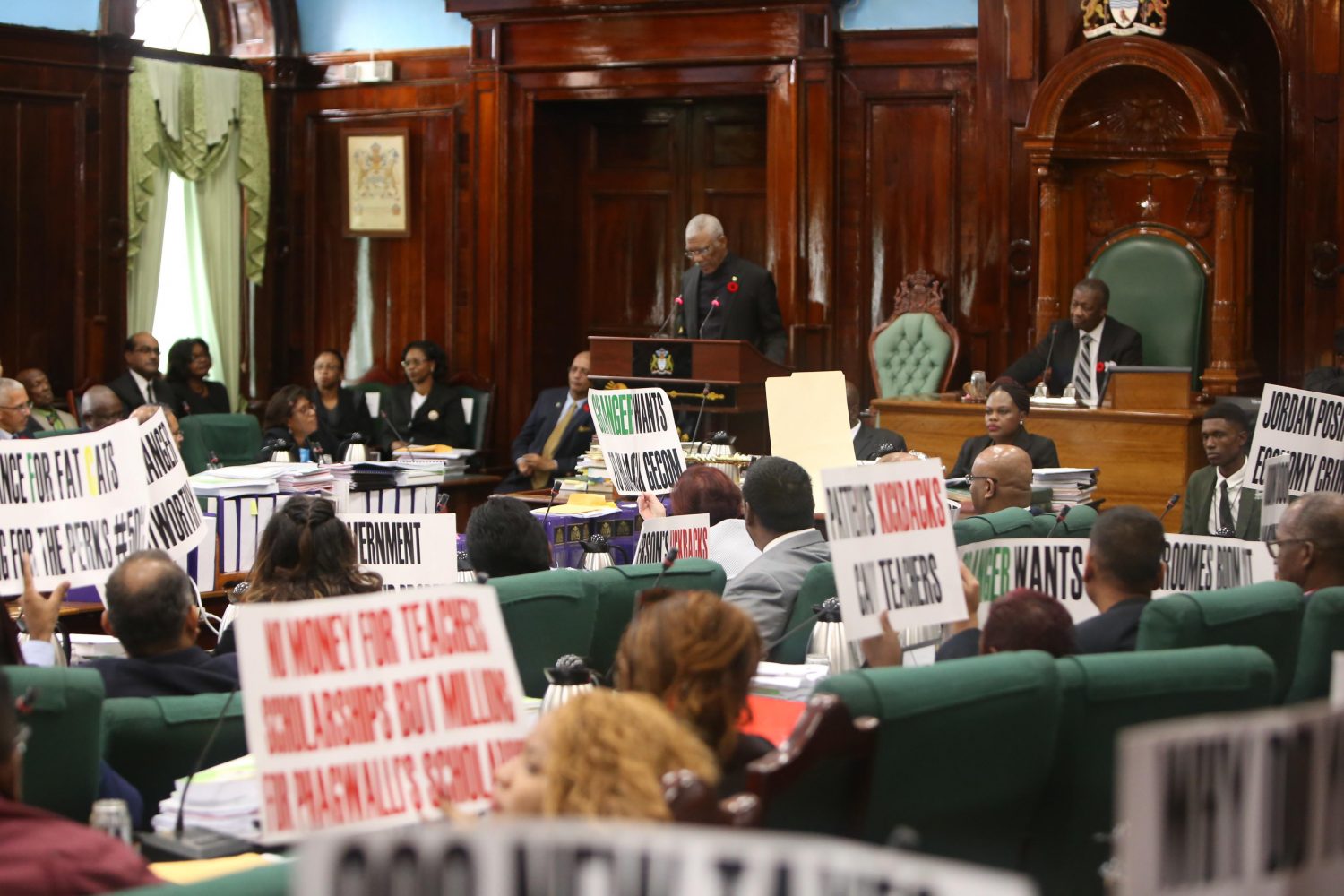Opposition MPs were yesterday reprimanded by Speaker Dr Barton Scotland for their raucous behaviour on November 2nd, when they staged a protest that drowned out most of President David Granger’s address to the National Assembly.
“The display showed by some Honourable members of this House was both intemperate and misguided at the 71st Sitting. Let it be recorded that this House strongly deprecates the conduct shown by some Honourable members on that occasion,” Scotland said in a strongly-worded statement ,which was read to the House shortly after yesterday’s sitting began.
Granger’s state of the nation address was mostly drowned out by heckling members of the opposition, who were protesting the unilateral appointment of retired judge James Patterson as Chairman of the Guyana Elections Commission.
At no point before, during and after his speech yesterday did Scotland announce any action to be taken against the offending Members of Parliament (MPs) nor did he explain why he did not object while the ruckus was occurring on November 2. He, however, hinted that the Opposition MPs might have been hoping for an intervention by him, which could have prevented the president’s delivery of his speech uninterrupted.
During his ten-minute address yesterday, the Speaker occasionally glanced at the opposition chairs but never singled out any of the MPs for disrespectful behaviour.
During the tumult on November 2, the Speaker had banged his gavel, which is meant to bring the House to order, but this was to no avail. He took no other action and this had raised queries. It was noted too that immediately after the president left the Chamber, the Speaker raised no objection to the opposition’s behaviour.
Scotland yesterday stated that the National Assembly is now being faced with attempts at introducing a new paradigm in conducting the business of the House. He reminded that the National Assembly allows for views and competing views to be expressed vigorously and even passionately by all members, but later noted that the rules of the National Assembly protect the rights of all members to speak, to hear and to be heard.
“It seems from recent events that the virtues we uphold in undertaking our business here are under attack”, he said before reminding the members that at the beginning of the 71st Sitting of the National Assembly and on the occasion of the visit by President Granger, “Your Speaker observed that some members held pamphlets, placards and other bits of paper bearing slogans, some of them with poor spelling and even poor grammar.”
He said that the Speaker also observed that some of the faces engaged in this “usual conduct were barely visible.” Scotland reminded that one of the placards focused on democracy and another on free speech. “It seems to the Speaker’s end …that such calls and the context in which they made were antithetical, [and] supremely ironic,” he said, before adding that those members were not satisfied with the breach of the rules of the House and as a result they descended into “creating a din more suitable for a place other than the National Assembly.”
After looking up momentarily at the opposition benches and inquiring if he had heard whispering in the Chambers, Scotland stressed that it is the practice that during the Speaker’s address to Parliament there is silence in the chamber and he urged all members to remember that.
He stressed that the opposition’s performance demonstrated “inherent disrespect” to the House, while at the same time continuing to claim the honour that being a part of the House confers on all members.
He pointed out that the National Assembly is governed by rules and they in part protect the rights of all members, including those who were part of the “exceptional parliamentary misconduct at the 71st sitting of the National Assembly.” He said that “there can be nothing in the display …that warranted the inexcusable and irredeemable performance of the honourable members.”
With regards to the pieces of paper with the slogans taken into the House, Scotland said that this can only be done with the permission of the Speaker, who may set terms and conditions which to him appear appropriate. He said that he received no request nor did he grant permission for placards or pamphlets to be taken into the House.
“It did seem as though those members were, by their conduct, inviting the intervention of the Speaker in order no doubt to acquire for themselves a new opportunity at bedlam. Your Speaker, Honourable Members, remained oblivious to the invitation. If the intention was to prevent the delivery by His Excellency, the President of his message to Parliament, then I must say to all Honourable Members that the purpose for which the 71st sitting of our National Assembly was called was fulfilled,” he said
According to Scotland, the presence of the President in the National Assembly is an occasion “on which Guyanese, who are members of the National Assembly, should gather to demonstrate respect to the State of Guyana and the personification of the State through the presence of His Excellency, the President.” It is a time, he said, for the members and their invitees to see all that is good and wholesome within the House. As such, there should be attentiveness and fine manners.
Scotland added that in the past he has reminded members that they are “called upon by their conduct to show veneration to this House. I repeat that call.” He added that views should be expressed with decorum and respect and that some forms of behaviour must not be visited upon in the National Assembly.
Opposition Leader Bharrat Jagdeo, during a press conference on November 8, was unapologetic for the PPP/C’s behaviour. “Why would we regret an action that we wanted to pursue to highlight the seriousness of the transgression by the president?” he questioned.






